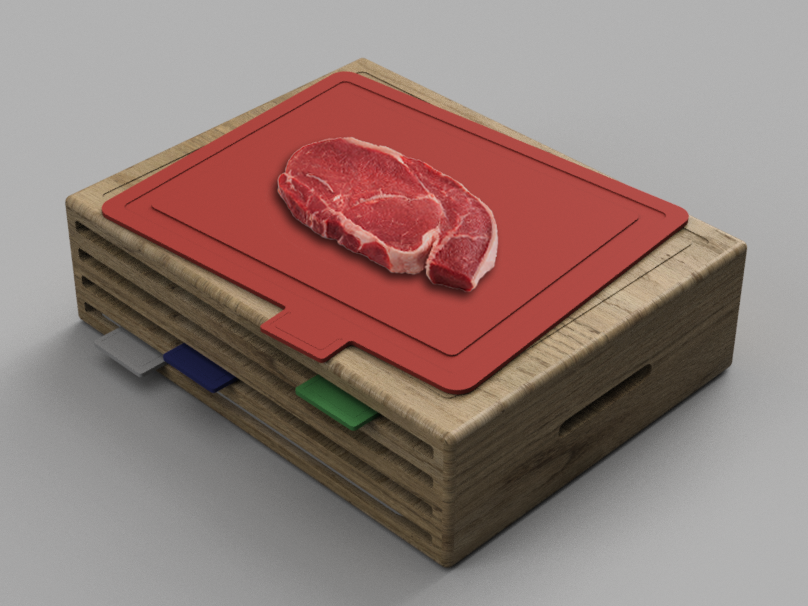Kitchens can be very messy environments containing multiple sources of bacteria being prepared all at once. Cross-contamination is not ideal between raw meats, fish, vegetables, and cooked food, and can cause serious illness or death. This 4-in-1 cutting board and storage unit solution, allows for one cutting board surface to be used for each type of food in order to reduce cross- contamination.
Research and Observations
While it is not an issue for professional chefs, the growth of the home chef has led to increased cross-contamination in the kitchen. Due to a recent surplus of cooking shows such as “Rachel Ray” and “Giada at Home”, a growing number of people are staying in and creating their own culinary masterpieces. Professional chefs are already attuned to the issues that result from cross-contamination between raw meats, vegetables, and cooked food and are trained in food safety while home cooks may not think about it.
Did you know the each year, foodborne illness causes:
1 in 6 Americans to get sick...
3,000 deaths...
128,000 people to become hospitalized...
Conceptualization and Concept Sketches
Cutting board illustrating the folding ability as well as signifiers for use
Concept design for box unit that stores cutting boards separately via shelving
Boards showing different textures for different types of food
Box design including rubberized strips on bottom, additional cutting board on top of box, and shelves for board
Cutting board dimensions
Box dimensions
Prototype Testing
User testing determined the placement of the tab on the board and the correct position of the folding feature. Both right-handed and left-handed people were asked to test the cutting board prototype in order to make the board as comfortable as possible. In addition, the board was also tested by both male and female users which further allowed for iteration on the board’s design to create an improved user experience.
Prototype Fabrication
In designing the final product, wood was used to create the storage box for its natural feel and its aesthetically pleasing look. The rounded edges on the box provided a smooth feel and added to the overall appeal of the storage unit. Each of the cutting boards was created from plastic as it is easy to clean and is more resistant to bacteria than other materials.
Final Concept
v/edge caters to the needs of kitchen users by offering them the ability to easily separate their cooking and cutting surfaces from each, reducing or eliminating the possibility of cross-contamination issues via cutting board. Each of the four cutting boards were created specifically for either vegetables, fish, cooked meat, or raw meat, with the top of the storage box doubling as a bread cutting board. The boards are housed separately via shelving in a storage box that can be stored either vertical or horizontally. The final assembly was designed using Autodesk Fusion and will be created using maple wood and HDPE plastic.
Vertical storage to save vital counter space
Ergonomic handle designed for hands of any size
Rubber strips on bottom and back for increased grip
4 food-specific cutting boards (dishwasher safe) to prevent cross-contamination
Special folding action to assist in moving food to pots and pans
Customized textures on each cutting board give you a better grip and catches crumbs and juices
This project was created in collaboration with another student, Alex Zylka, for RPI Design Studio III in Fall of 2015.






























